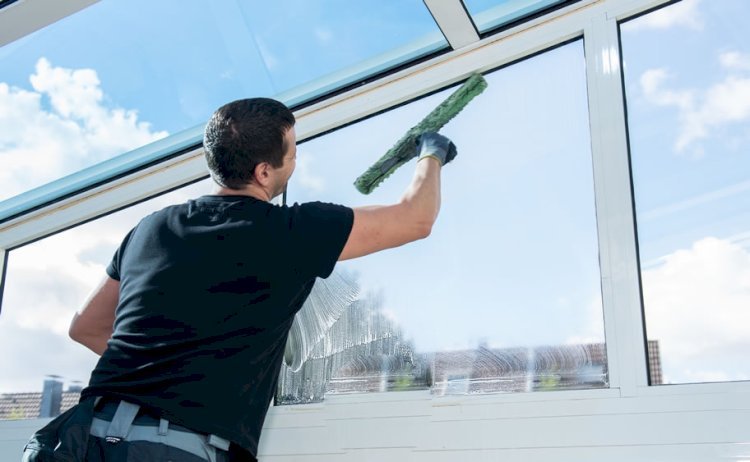How to Buy a Window Cleaning Business in the UK: A Complete Guide
Thinking of buying a window cleaning business? Learn how to conduct due diligence, negotiate, stay legal, and grow your new venture in the UK.

Purchasing a window cleaning business can offer high profit potential, low overhead, and scalability. The global cleaning services market, valued at $60.25 billion in 2022, is expected to grow at a 6.5% compound annual growth rate (CAGR) through 2029. With the UK commercial cleaning industry contributing over £55 billion annually, window cleaning remains a lucrative sector. This guide will explore the steps to purchasing a window cleaning business, including case studies, expert advice, and practical resources.
Why Invest in a Window Cleaning Business?

Investing in a window cleaning business is a low-barrier, high-potential opportunity, particularly in urban areas where demand remains steady.
Key Benefits:
- Consistent Demand: Urban areas with high numbers of office buildings and residential complexes offer stable, recurring business.
- Scalability: As demand grows, you can scale by hiring additional workers and expanding into new markets.
- Low Overhead: Equipment is relatively inexpensive, and there’s no need for a permanent storefront.
Success Story: In 2018, Mark Peterson, a former corporate sales manager, purchased a small window cleaning business in Manchester. Initially serving 30 residential clients, he expanded by offering additional services like pressure washing and gutter cleaning. Today, his company operates with a team of five, covering 100+ properties, both residential and commercial.
Market Potential
According to the UK’s Federation of Window Cleaners, there are more than 47,000 window cleaner business operators across the UK, and the sector is forecasted to grow by 3% annually due to urbanization and increased commercial property development, making buy window cleaning business opportunities increasingly attractive.
Conduct Thorough Due Diligence

Conducting due diligence is crucial when setting up a window cleaning business or purchasing one. This involves a deep dive into the business’s financial records, client base, contracts, and equipment.
Key Areas to Investigate:
-
Financial Statements: Review the past three years of profit and loss statements, tax filings, and cash flow records.
-
Client Retention: A retention rate of 70-80% is a strong indicator of a healthy business.
-
Contracts: Ensure client and supplier contracts are transferable and check for any exclusivity clauses that might limit your ability to grow the business.
Expert Quote: “Don’t just focus on the bottom line. A business may look profitable on paper, but if it’s reliant on a handful of clients, there’s a risk of losing revenue post-sale. Diversification of clientele is key when starting a window cleaning business UK,” says Tom Richards, a business acquisition consultant.
Case Study: Anna Brooks purchased a window cleaning business in London in 2019. Though the business had solid financials, Anna soon discovered that many of the clients had a close personal relationship with the previous owner. As a result, she lost nearly 50% of the client base after the acquisition. To avoid this pitfall, make sure to engage clients early in the transition and establish new relationships quickly.
Resource Links for Due Diligence:
Valuation and Negotiation

When valuing a window washing business, several factors come into play, such as annual profits, assets, and client contracts. On average, these businesses sell for 1.5 to 3 times their yearly profits.
How to Value the Business:
-
Revenue and Profit Margins: Look for a business with steady revenue and a profit margin of at least 20-30%.
-
Client Contracts: A business with long-term contracts, particularly with commercial clients, is more valuable due to guaranteed revenue.
-
Assets: Consider the age and condition of the equipment. Modern water-fed pole systems and vans can cost between £2,000-£5,000 each but are essential for efficient operation.
Negotiation Tip:
John Fields, who purchased a window cleaning business in Birmingham, negotiated the price down by 15% after finding that much of the equipment was outdated. He also negotiated an earn-out agreement where he paid part of the business's value over time, based on the business’s ongoing performance.
Adding these steps to your process helps ensure you secure fair terms and ensures you pay the right price if you plan to buy window cleaning business assets.
Legal Considerations

It’s essential to cover all legal aspects when you start a window cleaning business or purchase one to avoid potential pitfalls.
Contracts and Agreements:
Ensure that all contracts—client agreements, employee contracts, and supplier agreements—are transferable and legally sound. Look for any pending lawsuits or legal claims.
Expert Opinion:
“When buying a business, you must get legal advice, especially when it comes to contracts with employees or long-term commercial clients. Overlooking these details can lead to liabilities later,” advises Sarah Thompson, a commercial lawyer.
Legal Resources:
- Legal Advice for Small Businesses: LawDonut
Read More:15 Essential Gardening Tools Names for Every Home Gardener in 2025
Creating a Smooth Transition Plan

A well-planned transition is key to maintaining client and employee retention after the acquisition.
Tips for a Successful Transition:
- Retain Key Employees: Employees who know the business well are invaluable. Offer retention bonuses or incentives to keep them on board during the transition.
- Client Engagement: Meet with major clients personally to reassure them about the continuity of service. Offer special discounts or incentives for their loyalty.
Expert Insight: “The transition period is critical, especially with commercial clients who rely on consistent, high-quality service. Introduce yourself as the new owner, but make it clear that everything else will stay the same or get better,” says Chris Wright, owner of a large window cleaning firm.
Health and Safety Compliance

In the UK, window cleaning—especially at height—comes with strict health and safety requirements. Ensure the business complies with the Health and Safety at Work Act 1974 and has appropriate insurance.
Certification and Training:
- Employee Training: If the business includes high-rise window cleaning, ensure all employees are certified in using rope access or elevated work platforms (EWPs).
- Safety Compliance: Maintaining compliance not only protects your employees but also attracts larger clients who prioritize safety.
Expert Advice: “Many commercial clients won’t hire a company that doesn’t demonstrate rigorous safety practices. Having proper certifications and up-to-date training is not just a legal requirement; it’s a key differentiator in a competitive market,” notes Tom Wilson, founder of a high-rise cleaning business.
Marketing and Branding: Growing Your New Business

Once you’ve purchased the business, consider revamping the marketing and branding to attract new customers. In the digital age, establishing a strong online presence is essential. Many successful companies have grown rapidly by focusing on local SEO, online booking systems, and professional branding. A well-designed website, clear service offerings, and strong customer reviews can significantly boost visibility and trust. By following similar strategies and optimizing for local search terms like how to start a window cleaning business and window cleaning business for sale, your window cleaning business can attract both residential and commercial clients looking for reliable, high-quality service.
Case Study: Emma Hayes bought a small window cleaning business in Edinburgh in 2021. By optimizing her website for SEO and setting up a Google My Business profile, she tripled online inquiries within 12 months, landing several high-paying commercial contracts.
Online Marketing Tips:
-
Google My Business: Set up a profile to improve local search visibility.
-
SEO: Ensure your website is optimized for local SEO to attract more customers searching for services online.
-
Social Media: Use Facebook and Instagram to showcase before-and-after shots to attract clients interested in cleaning windows business services, along with customer testimonials and promotions.
Marketing Resources:
- Free Website SEO Tools: Ubersuggest
- Google My Business: Claim Your Listing
The Green Revolution: Offering Eco-Friendly Services

An increasing number of clients are looking for eco-friendly cleaning solutions, and offering eco-friendly services can give your window cleaner business an edge over competitors.
Expert Insight: Linda Mason, CEO of Green Clean Solutions, shares, “We’ve found that commercial clients, in particular, are willing to pay more for eco-friendly services. Green cleaning is not just a trend—it’s the future of the industry, with demand for these services growing by 7% annually.”
Planning for Future Growth

Once you've acquired the business, consider strategies for growth. You can expand by offering additional services, such as pressure washing, gutter cleaning, or even janitorial services. This cross-selling approach can increase client retention and diversify revenue streams.
Success Story: Mark Davis, who purchased a window cleaning company in Leeds in 2017, increased his revenue by 35% within two years by expanding into pressure washing and roof cleaning. Today, 40% of his business comes from these additional services.
Conclusion
Buying a window cleaning business UK or even exploring how to start a window washing business can be a lucrative investment with low entry barriers and high growth potential, particularly in urban areas with consistent demand. By conducting thorough due diligence, negotiating effectively, ensuring legal compliance, and developing a strong transition plan, you can set yourself up for success. Leveraging modern marketing techniques, offering eco-friendly services, and expanding into related services will help grow your business. With the right strategy, you can transform a small operation into a thriving enterprise.
Frequently Asked Questions (FAQ)
1. What is the typical profit margin for a window cleaning business?
Profit margins for window cleaning businesses generally range from 20% to 30%, depending on the size, service range, and client base.
2. How much does it cost to buy a window cleaning business in the UK?
The price typically ranges from 1.5 to 3 times the annual profit. For example, a business with a yearly profit of £80,000 could be priced between £120,000 and £240,000.
3. What legal requirements should I consider when buying a window cleaning business?
Key legal considerations include transferring contracts, complying with the Health and Safety at Work Act 1974, and checking for any outstanding debts or liabilities.
4. How can I attract new clients after purchasing a window cleaning business?
Invest in digital marketing, optimize your website for SEO, claim your Google My Business profile, and engage with local community groups or business directories.
5. Is it beneficial to offer eco-friendly cleaning services?
Yes, many clients, especially commercial ones, are increasingly seeking eco-friendly services. This can be a unique selling point, with demand for such services expected to grow by 7% annually.

















